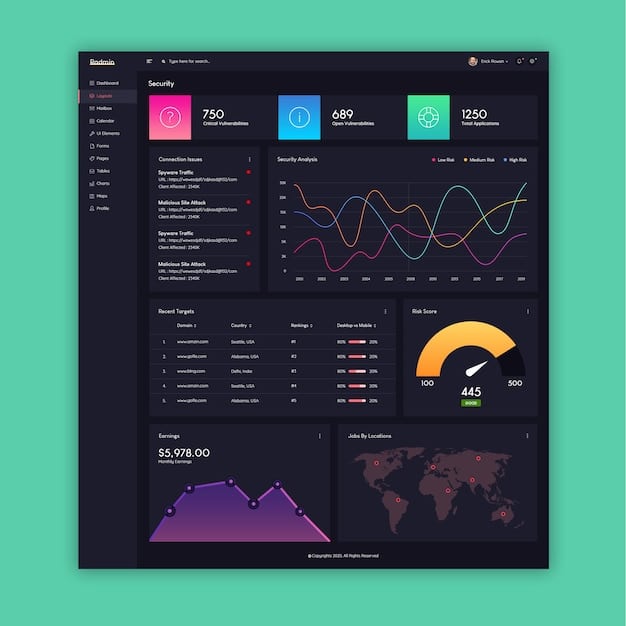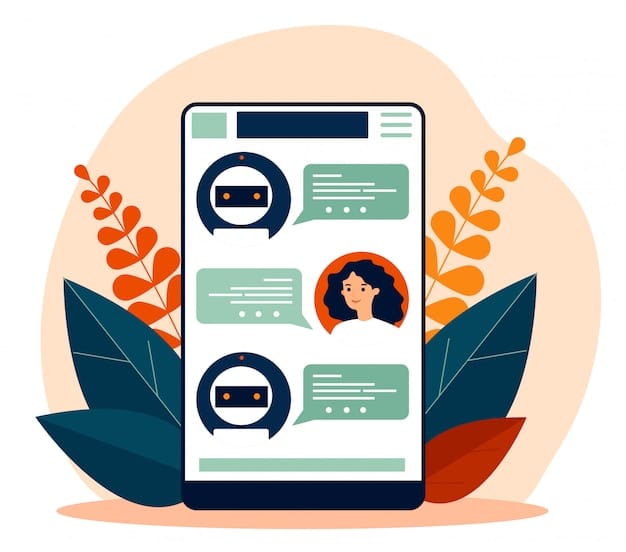AI-Driven Automation: Latest Trends for US Marketing Teams

The latest trends in AI-driven automation for US marketing teams include personalized customer experiences, predictive analytics for campaign optimization, and streamlined content creation processes.
The relentless evolution of technology continues to reshape the marketing landscape. Among the most transformative forces is artificial intelligence (AI), particularly its application in automation. For US marketing teams, understanding and leveraging the latest trends in AI-driven automation is no longer a luxury but a necessity for staying competitive and achieving superior results.
Understanding the Rise of AI in US Marketing
The integration of AI into marketing automation isn’t just about making processes faster; it’s about making them smarter. By analyzing vast datasets, AI algorithms can identify patterns, predict customer behavior, and personalize interactions at scale. This leads to more effective campaigns, improved customer engagement, and a higher return on investment for US marketing teams.
The Shift from Traditional to AI-Powered Automation
Traditional automation tools rely on pre-defined rules and workflows. AI, on the other hand, uses machine learning to adapt and optimize these processes in real-time. This means that campaigns can become more responsive to customer behavior, leading to better results.
Key Benefits of AI-Driven Automation for Marketing Teams
Implementing AI automation can provide significant benefits. This includes enhanced personalization, improved lead scoring, and better content creation.
- Improved efficiency in marketing campaigns.
- More personalized customer experiences.
- Better data-driven decision-making.
- Significant time and cost savings.
In summary, AI in US marketing represents a crucial progression from basic automation to dynamic, intelligent systems that drive better engagement and ROI.

Personalized Customer Experiences with AI
One of the most impactful trends in AI-driven automation is the ability to create highly personalized customer experiences. AI algorithms can analyze customer data to understand individual preferences, predict their needs, and deliver tailored content and offers. This level of personalization can significantly improve customer satisfaction and loyalty.
AI-Powered Recommendation Engines
AI recommendation engines can suggest products or content that are most relevant to each customer, increasing the likelihood of a purchase or engagement.
Dynamic Content Optimization
AI can dynamically adjust website content based on user behavior, ensuring that each visitor sees the most relevant information.
- Personalized email marketing campaigns.
- Targeted advertising based on individual preferences.
- Customized website experiences for each visitor.
- Real-time content adjustments based on user behavior.
Essentially, AI-driven personalization tailors interactions to meet individual customer needs, cultivating richer relationships and driving marketing success.
Predictive Analytics for Campaign Optimization
Predictive analytics is another key trend in AI-driven automation for US marketing teams. By analyzing historical data, AI algorithms can predict future outcomes and identify the most effective strategies for optimizing marketing campaigns. This allows marketers to make more informed decisions, allocate resources more efficiently, and achieve better results.
Forecasting Customer Behavior
AI can predict which customers are most likely to convert, allowing marketers to focus their efforts on the most promising leads.
Identifying Optimal Channel Mix
AI can determine the most effective channels for reaching specific customer segments, optimizing the channel mix for each campaign.
- Enhanced A/B testing with AI-driven insights.
- Proactive identification of potential campaign issues.
- Improved ROI through data-backed decisions.
- More efficient resource allocation.
Therefore, predictive analytics provides US marketing teams with the insights needed to optimize performance, reduce risks, and maximize their ROI.

AI-Powered Chatbots and Customer Service
AI-powered chatbots are revolutionizing customer service by providing instant, personalized support. These chatbots can handle a wide range of inquiries, resolve common issues, and escalate complex problems to human agents. By automating customer service tasks, chatbots free up human agents to focus on more strategic initiatives, improving overall efficiency and customer satisfaction for US marketing teams.
24/7 Availability and Instant Responses
AI chatbots can provide customer support around the clock, ensuring that customers always have access to assistance.
Personalized Interactions and Recommendations
Chatbots can analyze customer data to provide personalized recommendations and solutions.
- Reduced wait times for customer support.
- Improved customer satisfaction scores.
- Increased efficiency in handling customer inquiries.
- Cost savings through automation of routine tasks.
In brief, AI-powered chatbots streamline customer service, offering personalized support and improving overall customer experience.
Streamlined Content Creation with AI
Content creation is a time-consuming and resource-intensive task for many US marketing teams. AI-driven automation can streamline this process by generating content ideas, writing copy, and even creating visual assets. By automating content creation tasks, AI allows marketers to focus on more strategic initiatives, such as content planning and distribution.
AI-Driven Content Generation Tools
AI can generate blog posts, social media updates, and other types of content based on specific keywords and topics.
Automated Image and Video Creation
AI can create visual assets, such as images and videos, based on marketing campaign requirements.
- Faster content creation cycles.
- Increased volume of content production.
- Improved content quality and consistency.
- Enhanced content personalization.
Ultimately, enhanced content creation with AI simplifies operations, boosts productivity, and drives improved engagement.
Improving Lead Scoring and Qualification
Lead scoring and qualification are critical processes for US marketing teams. AI-driven automation can improve the accuracy and efficiency of these processes by analyzing lead data to identify the most promising prospects. This allows marketers to focus their efforts on leads that are most likely to convert, improving sales efficiency and revenue generation.
AI-Powered Lead Scoring Models
AI can analyze lead data to assign scores based on their likelihood of converting into customers.
Automated Lead Nurturing Campaigns
AI can automate lead nurturing campaigns, delivering personalized content and offers to potential customers.
- More accurate lead scoring.
- Improved sales conversion rates.
- Increased efficiency in lead nurturing.
- Better alignment between marketing and sales teams.
In essence, AI enhances lead handling, boosting marketing effectiveness and sales alignment.
Challenges and Considerations for US Marketing Teams
While the benefits of AI-driven automation are clear, US marketing teams must also be aware of the challenges and considerations involved in implementing these technologies. Data privacy concerns, lack of skilled personnel, and integration complexities are some of the hurdles that organizations may face. By addressing these challenges proactively, marketing teams can ensure a smooth and successful transition to AI-driven automation.
Data Privacy and Security
AI algorithms rely on vast datasets, raising concerns about data privacy and security. Marketing teams must ensure that they are compliant with data privacy regulations and that they have robust security measures in place to protect customer data.
Skills Gap and Training
Implementing and managing AI-driven automation tools requires specialized skills. Marketing teams may need to invest in training and development programs to bridge the skills gap and ensure that their employees are equipped to work with these technologies.
- Addressing data privacy concerns.
- Investing in training for skilled personnel.
- Ensuring proper integration with existing systems.
- Monitoring and optimizing AI performance.
In conclusion, by proactively tackling the challenges associated with AI, US marketing teams can facilitate a seamless and impactful integration.
| Key Point | Brief Description |
|---|---|
| 🚀 Personalized Experiences | AI enhances interactions to meet specific customer needs, improving relationships. |
| 📈 Predictive Analytics | AI forecasts behavior, optimizing campaign strategies and ROI. |
| 🤖 AI Chatbots | Provides 24/7 personalized support and handling customer inquiries efficiently. |
| ✍️ Content Creation | AI streamlines creation, boosting productivity and engagement. |
FAQ
▼
AI enhances marketing by automating tasks, personalizing interactions, improving decision-making via advanced analytics, and streamlining content creation, leading to better engagement and ROI.
▼
AI analyzes customer data to understand preferences, enabling tailored content. Mechanisms such as recommendation engines and dynamic content ensure relevant customer interactions, heightening satisfaction.
▼
Chatbots deliver immediate, round-the-clock support and personalized solutions. Handling widespread queries, they allow human agents to focus on multifaceted issues, streamlining support.
▼
AI assesses lead data, pinpointing high-potential prospects. Automated nurturing campaigns subsequently target with offers and content, boosting sales and improving marketing focus.
▼
Risks involve data privacy concerns, requisite skilled personnel, and complexities in tool integration. Compliance with regulations is crucial, as is staff training to successfully manage the technologies.
Conclusion
As AI continues to evolve, its impact on US marketing teams will only grow. By embracing these latest trends in AI-driven automation, marketers can unlock new opportunities for growth, improve customer engagement, and achieve lasting success in an increasingly competitive landscape. Being proactive and well-informed about AI’s potential paves the way for a transformed and optimized marketing strategy.





